(My three prior posts on Germany: Walking Ruhr Valley, Walking Rhine Valley, Walking Gorlitz)
In my two-plus weeks in Germany I walked over fifteen miles per day, all while lugging around a twenty-pound backpack. Usually that means I need to worry about losing weight, like I did when I walked across England, but in Germany I put on over five pounds.1
Why? Because Germany has the world’s best beer, which is pretty well known, but they also quietly have perhaps the worlds best bakeries, which I’m sure will get the French, and others, screaming.
Germany’s long history of beer brewing, where almost every city has its own style, means each bar’s a living museum to a particular variety. Dortmund bars are little temples to Dortmunder, Dusseldorf to Altbier, and Cologne to Kölsch, and so on, turning long walks through Germany into the best possible kind of pub crawl2: A sampler of not only different bars, but of entirely different beer cultures.
Germans’ knowledge of beer isn’t limited to upscale joints. Even the smallest, dingiest dive bar has an owner, customers, and bartenders who care about what is being served, to the point of excessive pride.
In the outskirts of Cologne, when I jumped into a bar at 10 am to flee the rain, a place packed with retirees clutching racing forms and playing video poker machines, I knew I’d find the same care from the bartender that I’d found at the upscale restaurants. I knew my Kölsch would come in its own unique glass, a stange, a small delicate cylinder, shaped to best presents and preserves the taste.

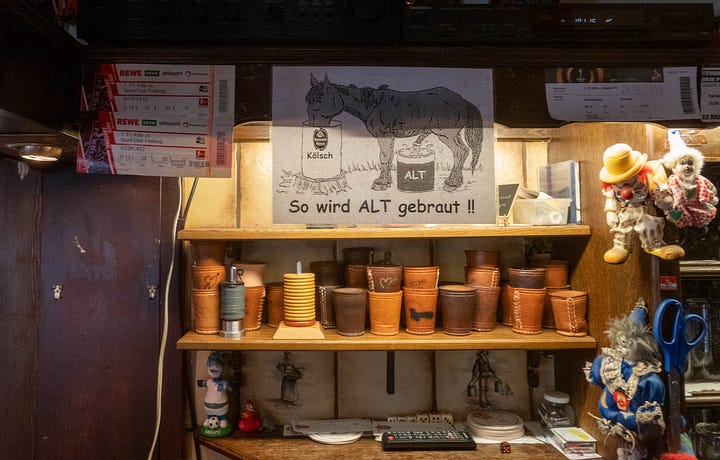
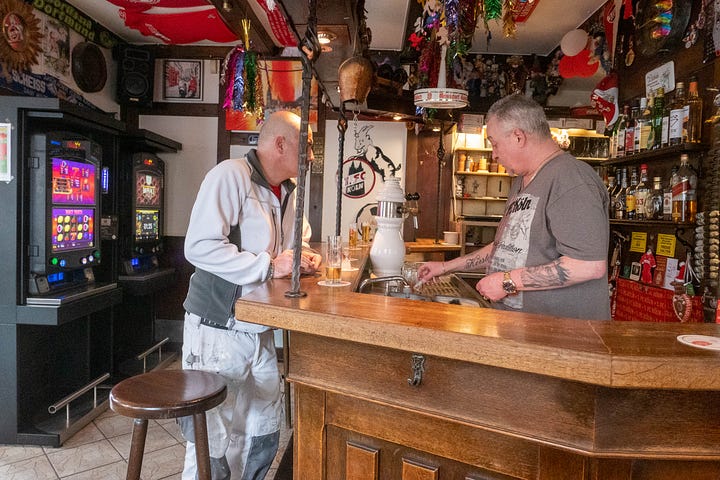
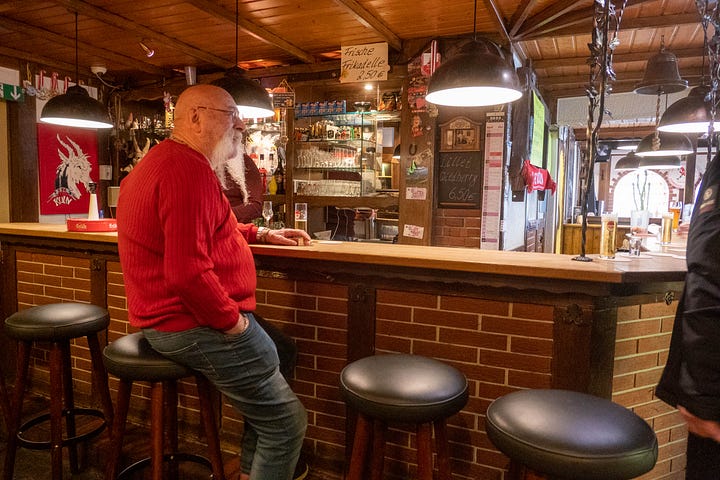
I also knew that when it was about finished the bartender would nod over to me asking if I wanted another, then if I nodded back, fastidiously fill a new stange, not with too much or too little foam, bring it over, and then make another small tick on my coaster, to tally up at the end to know what to charge me.
In every bar, pub, and beer hall in Germany, I knew I would find that same level of attention, consideration, and love that separates crafts from jobs, because beer in Germany rises to the craft level. There is a deep history, knowledge, and substance behind it. It’s not this canned thing in a refrigerator that’s the same from city to city, bar to bar, and restaurant to restaurant.
That boundary, between a craft and a product, behind being a craftsmen and working just another job, is the difference between pride and drudgery, between truly fulfilling work, and just getting by. Between dignity from work, and a cold crushing indifference from it. It is a huge boundary, with huge social ramifications, especially for men, who seem to have almost a genetic mandate to need to be seen as being useful at a physical work level.
The other nice thing about bars in Germany is the lack of belligerence. Maybe that’s because I never drank past 10 pm, but compared to England, where I also didn’t drink late, and which also has a well-earned beer culture, there were never sloppy drunks. People in Germany drink to be social, to be happy, to be a good person. Not, like in so much of England, with its lad culture, to get pissed and legless.
So I drank a lot in Germany, almost every afternoon and evening, something I have a bad tendency to do, but here I could justify it at both an intellectual and practical level, because the body after walking fifteen miles really appreciates resting in a bar drinking a perfectly chilled crafted Kolsch. Which is dangerous. Justifying a vice is the sin of every addict.
That was my afternoons and evenings, post walk. My mornings and walking breaks were spent in bakeries.
Which in Germany are everywhere, serving as combo pastry shops, coffee shops, and sandwich shops. A craft-level version of a combined Dunkin’ Donuts, Starbucks, and Subway.
A place where you can get a breakfast of freshly made croissants, and other absurdly caloric things, and a latte. Then for lunch, a salami, cheese, and egg sandwich on a fresh made roll of your choosing. Or, my favorite, a Mettwurst and onion sandwich.
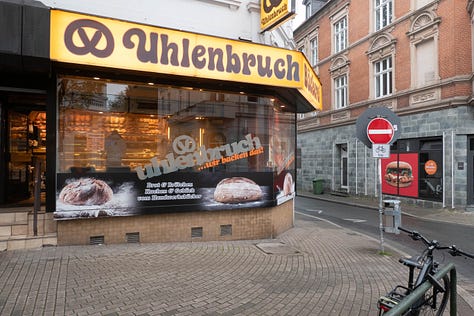
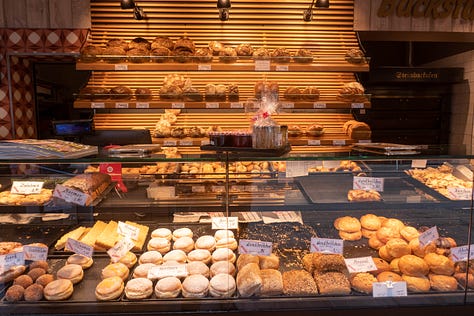
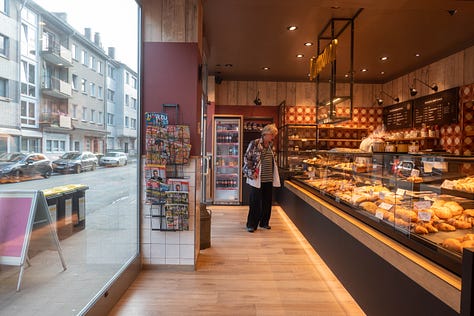

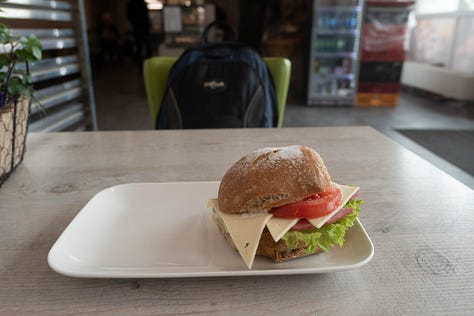

Each and every thing I got in a Germany bakery was fantastic, except perhaps the lattes, which they don’t seem to know how to do, or I don’t appreciate.
While most things in Germany cost about the same as in the US, the prices in the bakeries were below what you would pay at a Dunkin’, or Starbucks, or god forbid, a Subway, a place that makes perhaps the worst sandwiches in the world.
While the idea that America has a bad, or no, food culture is wrong, because you can always get the best X (Mexican, Italian, Thai, Japanese, name whatever cuisine you want) somewhere in the US, there also exists in the US a wide acceptance of prepackaged, mass produced, tasteless, crap.
It really doesn’t have to be that way, and it mystifies me why, when you see German bakeries, which are everywhere, in every neighborhood regardless of wealth, the US continues to accept, and even celebrate, places like Subway sandwiches or Dunkin’.
Or, to go back to beer, why they accept Bud from a can, when there are so many better options.
So yes, I’ll be a snob on this one, because I’m pretty confident that if you give any American a salami and cheese sandwich from an average German bakery, they will realize it’s better than what they’ve learned to accept. I’ve seen that with beer in the US, where more and more people are turning to craft brews, when given the chance. Even in “downscale” towns and neighborhoods. Why not with bakeries?
Bars and bakeries kept me physically satiated, for relaxing in nature, which there wasn’t much of since I chose to walk along the most industrial region in the world, I stopped in schrebergartens, which are basically community gardens on steroids. Five or six acres of lovingly cared for postage-stamp sized rural villas, all jammed together.
There are schrebergartens almost every few miles, carved-out green spaces in an otherwise dense urban landscape.
Community gardens on steroids is my description of them, here is what lazy-writer ChatGPD has to say about them,
What ChatGPD fails to mention is it’s as much about the small cabins on the rented plots, as it is about the gardens. They are effectively summer homes, or at least summer weekend get-aways. Where families can sit on the veranda sipping beer, watching TV or whatever, after having spent the day tending to their flowers.
That’s the part of them I really appreciate. The communal. They are collective rural retreats, a neighborhood of miniature second homes, which in the Rhine and Ruhr valley, is a nice space “hack.”
The personalization that goes into each of the little plots is what struck me the most. They are like a physical version of someone’s Facebook page, loaded up with bling and flair. Almost everyone flies a flag over their plot, usually related to their ancestry, or their favorite soccer club, and the garden are stuffed with statues, gnomes, and other kitsch.
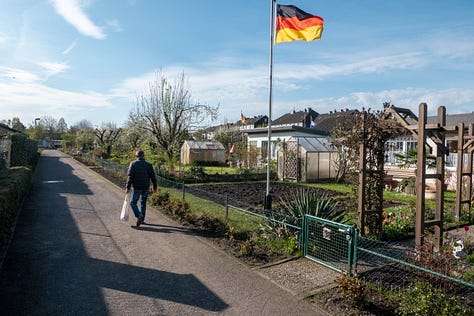
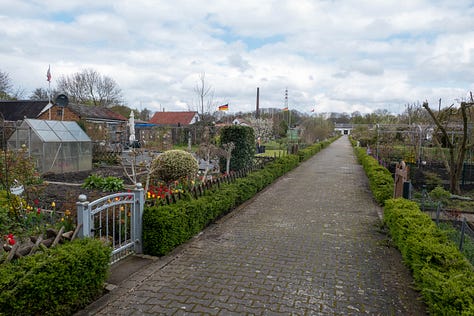
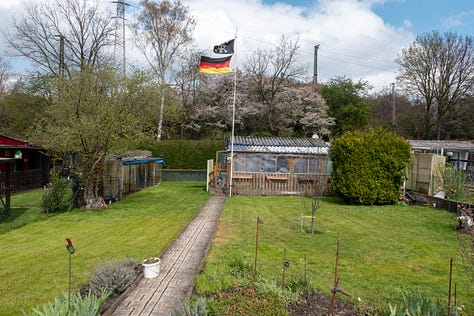
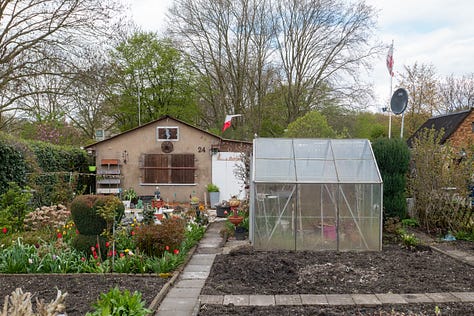
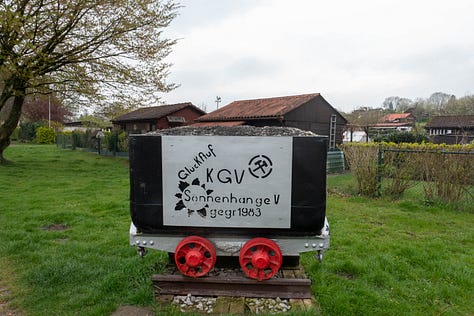
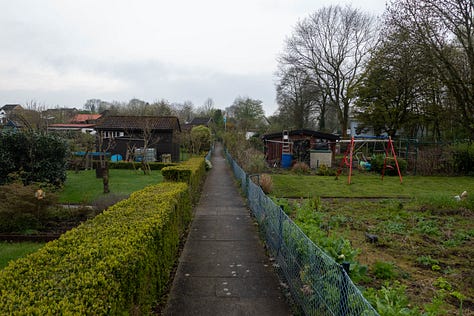
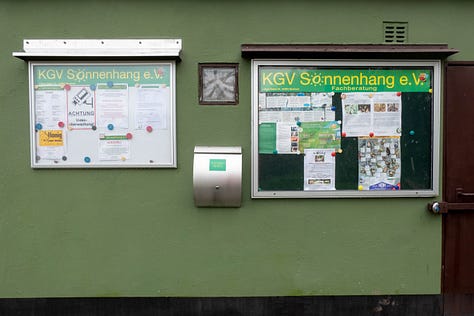

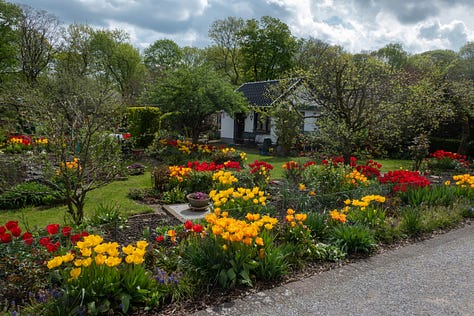
Germany is of course more than just nice bars, bakeries, and schrebergartens. Yet each of them is a small example of what I appreciate most about Germany, and Germans: They care about more than themselves.
To refer back to an old piece of mine, they are a high trust society (and high regulation), with a national desire to be good citizens. A desire that isn’t driven by only the fear of breaking the law, but also from the fear of not being a good neighbor.
It’s that high trust which separates, and differentiates it, from the US, which means, when they builds things, they are nice, and they work
You see that in public transportation. While I didn’t ride the buses or trams (I did take a few long-distance railroads), I dealt with them enough to realize how wonderful they are.
They are everywhere, functional and clean. Trams with stops that don’t smell of urine. Lights that aren’t stolen or broken. Benches that are not jammed with trash.
The are also unobtrusive. Little thin trains going down the street, without a lot of accompanying bulky and ugly stuff. When the US attempt to build similar things, they come with so much accompanying and obtrusive infrastructure. Like massive platforms, tons of signals, and heavy and bright signage. Or no infrastructure at all, beyond useless stuff like La Sombrita.
That’s not simply a regulation issue, which got me thinking about how we live in the US. How we take up so much space, and when we build things, we build massive things.
People hate to talk about national cultures, but they exist, which you realize when you travel.
Compared to Germany, the US has a cult-like attachment to individuality, and self-reliance, at a thick cultural level. Which explains our low trust society. Care only about your own concerns, worry only about what others can do for you, or more importantly to you.
It also explains our desire/demand for space. Lots of it.
Americans want their own thing and are less taken to the actuality of living crowded together, in a communal manor (shared public things, including transport) unless they have, relative to the rest of the world, a fair amount of acreage. We are not content with a tiny plot in a community garden, we want the full blown summer retreat with it’s own yard, garden, and pool, and we don’t want thin trams where you have to crowd together, we want our own F-450, or if not that, a wide subway.
That desire for our own thing results (when combined with the basic human desire to cluster, and our winner-take-all economy that favors only a few locations) in cities and neighborhoods with limited capacity, and so with overly expensive housing. The resulting exclusivity then ends up being a nice added status symbol to add to your identity.
This is one of the reasons we have sky-high housing prices, especially in places like Manhattan, Los Angeles, Miami, and San Francisco. It is part of the answer to the NIMBY versus YIMBY debate Twitter is so obsessed with, because even when we do build, we build big things.
You can call what we have a car culture, but that’s a thin description. A symptom of our larger, and deeper demand for independence. And anyways, wanting a car isn’t unique to the US3.
Again, the thick description, or a deeper description, is our cult of independence, or reworded our “I want my own thing including space and a lot of it” culture. Which is part of the American dream. To be successful is to have your own little kingdom, that you are lord of.
So we build big homes and bulky trams, when we build them at all.
And we also eat in Subways and Dunkin', because unlike in Germany, food as a craft isn’t an essential part of the American dream. Rather it’s one of those transactional things, that often takes up time and gets in the way of climbing higher, so food is food, as long as it fills you up.
Ok. Maybe I’m overthinking it and Americans just likes bad food. Or maybe I’m just being overly negative about the US, which is hard not to be if you travel a lot.
Because the more you see of the world, the more you get frustrated, and sad, with where we are headed.
PS: Sorry for turning every essay into a rant on the US. We are a great country, and there is a lot to love about America, but I can’t shake the feeling we are in a bad place, and it’s going to get worse, before it gets better.
PSS: I leave for Dakar tomorrow. Where there are currently street protests against the government, and cell service is being limited. I hope not to write about the politics of Senegal, but we will see if events force me to.
I’ve lost all that weight, and more, since being home. My diet tip is simple. Don’t eat much. At all. Dieting is about total calories consumed, versus burned, for the day, and consuming less is easier than burning more.
My diet is a latte in morning, then one meal (a chicken breast in a low carb wrap) at 4pm, then a bowl of popcorn at night.
Coupled with walking 10 miles per day, that leaves me about 1200 calories short per day, and so a weight loss of about 1/2 lb per day.
The first few days are rough, but once you adjust, you realize feeling slightly hungry is no less of a discomfort than feeling bloated, or stuffed. In fact, there is almost an euphoria that comes from a slight hunger. Which makes me almost get the idea of fasting.
I hate pub crawls. Especially the ones where packs invade a bar, make a mess of things, then head off to the next bar to ruin.
When anyone in the world has enough $ to get a car, they almost always get a car, even if it’s not practical, including Germany.







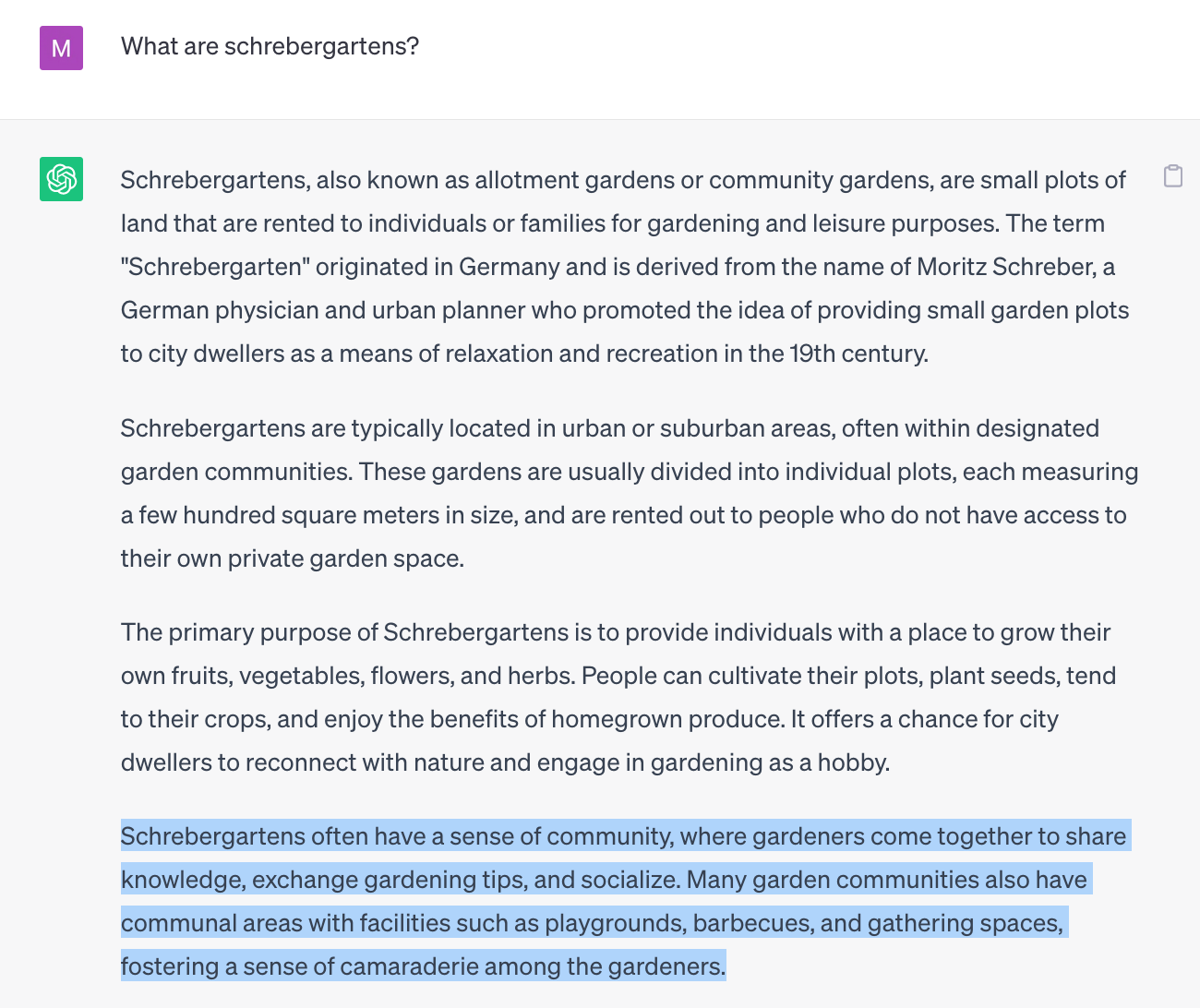

Chris,
Today's post 'pushed me over the edge', and I'm now a paid subscriber.
I've really been enjoying your German walks, and a lot of what you've said about the difference between Germany and the USA apply here in Australia - while there is pride here in food & beverage culture, there is also a huge part of my country that only seems to want fuel rather than food.
And similar issues/values on ownership and why we can't have nice things.
Keep 'em coming!
No Chris, you’ve absolutely nailed it about America’s fetishization of the “Individual”. We have no sense of the common good or even how to go about achieving it, or that we even should.
I lived in Germany twice. First, in 1969, as a chambermaid in a hotel in Grainau, the small village at the foot of Germany’s tallest mountain. Then 8 years later I returned as a foreign exchange student to study at Georg August University in Göttingen.
I loved living there, and reading your missives from Germany especially brings back all the wonderful memories. Thanks